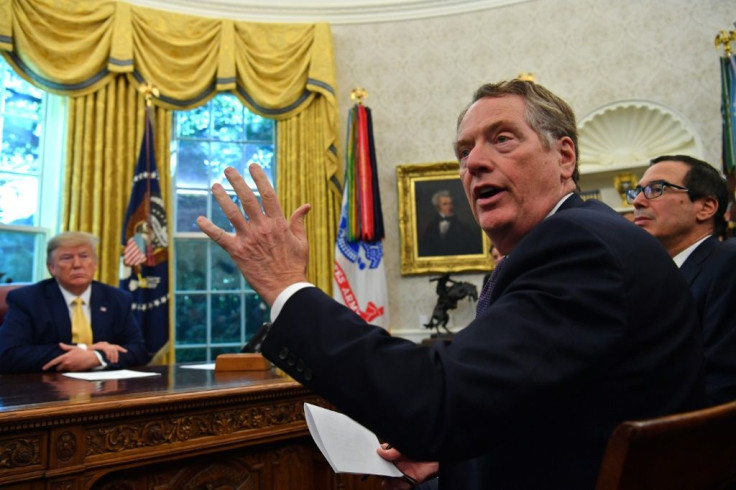US May Hit $3.1 Billion Of European Imports With New Tariffs As Trade War Escalates

KEY POINTS
- The Distilled Spirits Council of the U.S. pushes back on U.S. proposal
- Washington is using new duties to force a deal on aircraft subsidies
- EU promises retaliation if US doesn't restart negotiations
The U.S. government is considering slapping new tariffs on $3.1 billion worth of exports from France, Germany, Spain and the U.K., raising fears of a prolonged trade war across the Atlantic.
The U.S. Trade Representative seeks to apply new tariffs on European exports including olives, beer, gin and trucks, while raising existing tariffs on such goods as aircrafts, cheese and yogurt.
The new duties may even be as high as 100%, which would, in turn, double the price of these products for U.S. importers. At that high level, such goods may be blocked from the U.S. entirely.
Bloomberg reported that if these new tariffs are implemented, they would badly hurt European luxury brands like Givenchy and Hermes (which make leather goods); Remy Cointreau and Pernod Ricard (producers of cognac and champagne) as well as LVMH Moet Hennessy Louis Vuitton.
Tariffs on U.K. gin would likely hurt British liquor manufacturers like Diageo Plc (the maker of Tanqueray); James Burrough (which makes Beefeater gin); and William Grant & Sons (producer of Hendricks gin).
The new duties would serve to add on to the 25% tariff that Washington effected last year on imports of Scotch and Irish Whiskey and liqueurs and cordials from Germany, Ireland, Italy, Spain, and U.K. (The EU has imposed a tariff of 25% on all U.S. whiskey imports.)
The Distilled Spirits Council of the U.S. came out strongly against the proposed tariffs, citing they would only “escalate trade tensions across the Atlantic and further jeopardize American companies and hospitality jobs already under duress as a result of COVID-19.”
The Council said that EU and U.S. distilled spirits companies have “suffered enough” as a result of this trade war, noting that American whiskey exports to the EU have dropped by 33% and cost $300 million since the EU’s 25% retaliatory tariff went into effect.
“The longer these disputes go unresolved, the greater the threat of even more tariffs on our industry,” the Council added. “The EU has stated it may impose retaliatory tariffs this spring on U.S. rum, vodka, and brandy… In addition, the EU is scheduled to increase its retaliatory tariff on American whiskey to 50% in spring [of] 2021.”
The Council urged both the White House and EU states to “de-escalate this trade dispute by simultaneously removing the U.S. tariffs on EU beverage alcohol products and the EU’s tariff on American whiskey.”
Meanwhile, the top trade official in the U.S., Robert Lighthizer, may apply even more pressure on Europeans by using a tactic called “carousel retaliation,” under which a nation periodically shifts tariffs on different goods.
In early 2020 the U.S. already resorted to this carousel strategy by raising tariffs on exports of Airbus aircraft and parts from 10% to 15%.
Closely linked to the U.S.-EU trade conflict is the ongoing battle over aircraft subsidies that involves the World Trade Organization. A few years ago the trade arbiter said both the U.S. and the EU were guilty of illegally supporting their own aircraft industries.
Last October, the WTO allowed President Donald Trump to retaliate against $7.5 billion worth of EU exports as a response to Europe’s illegal subsidies to aircraft maker Airbus. Next month the WTO will deliver a retaliation award to the EU in a separate case involving U.S. subsidies to Boeing Co. (BA).
Lighthizer said the goal behind the higher tariffs is to force the EU to agree to a settlement on aircraft subsidies – although talks between the U.S. and the EU collapsed this year.
“The U.S. has stepped back from the settlement talks in recent weeks,” said EU Trade Commissioner Phil Hogan. “If this remains the case, the EU will have little choice but to exercise its retaliation rights and impose our own sanctions.”
The EU has also asked the WTO to allow the bloc to impose tariffs on up to $11.2 billion worth of U.S. exports to Europe as a form of retaliation for America’s illegal subsidies to Boeing.
“There is no valid basis for the EU to retaliate against any U.S. goods,” Lighthizer said. “We will continue to press the EU to negotiate a resolution that respects the WTO’s findings.”
Europe is specifically targeting tariffs on U.S. industries that are believed to be close to Trump and his Republican allies in Congress, including coal, farms, fisheries, and aircrafts.
The EU was perturbed by Trump’s renewed threat to impose levies on European autos, and his vow to hurt France, Spain and Italy with tariffs if they enact a tax on international technology companies.
© Copyright IBTimes 2025. All rights reserved.



















